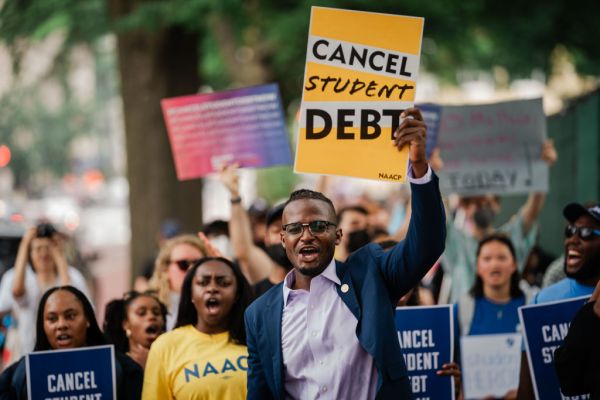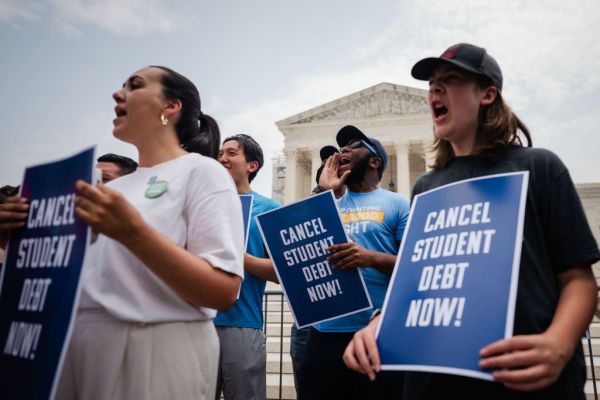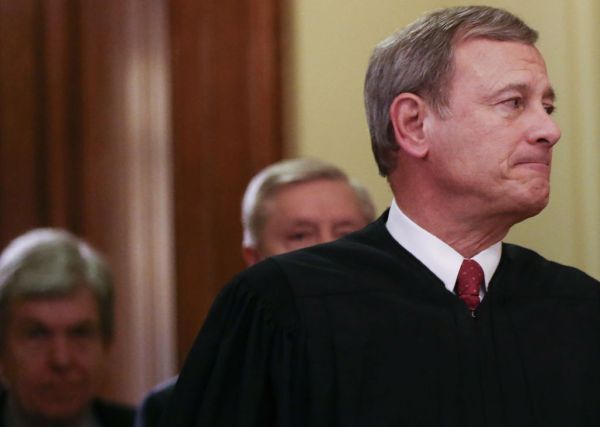From the moment President Joe Biden announced he would forgive hundreds of billion dollars of American student loan debt using emergency pandemic authorities, it was inevitable the unilateral move would face legal challenges.
The first such challenge was filed Tuesday in the U.S. District Court for the Southern District of Indiana by the conservative Pacific Legal Foundation, which bills itself as “the nation’s most relentless organization fighting against unconstitutional government overreach.” It accuses Biden’s Department of Education of ignoring that “Congress is the branch of government that possesses the exclusive power to make law” by claiming “the Secretary of Education has the power to ‘automatically’ issue blanket loan forgiveness to 8 million borrowers.”
The suit takes aim at Biden’s ability to broadly forgive loans under the 2003 HEROES Act, which gives the secretary of education the ability to provide debt relief to any person who “suffered direct economic hardship as a direct result of a war or other military operation or national emergency.” The Biden administration has argued this provision can be stretched to include every borrower in the country under the ongoing COVID-19 national emergency. The PLF’s suit argues that the HEROES Act “bestows the Executive with lawmaking power in violation of Article I of the Constitution.”
The suit’s plaintiff is Frank Garrison, an Indiana resident, a PLF attorney, and a holder of student debt. Far from bringing him relief, the filing alleges, Biden’s debt cancellation is actually likely to result in financial harm to Garrison, who—as a full-time nonprofit employee—will eventually likely be eligible for full debt forgiveness under the Public Service Loan Forgiveness program. The harm would come because Indiana is one of six states that currently intends to tax Biden’s loan cancellation as income.
“Mr. Garrison will face immediate tax liability from the state of Indiana because of the automatic cancellation of a portion of his debt,” the filing argues. “These taxes would not be owed for debt forgiveness under the Congressional authorized program rewarding public service. Mr. Garrison and millions of others similarly situated in the six relevant states will receive no additional benefit from the cancellation—just a one-time additional penalty.”
To the layman, Garrison might seem like an odd plaintiff for a test case against a program like Biden’s loan cancellation. But the move is intended to get over what many experts anticipated would be a major hurdle when challenging Biden’s move in court: proving standing to sue.
In order to challenge the constitutionality of a particular government action, a litigant must first convince a court they themselves have standing—that is, that they have suffered or would suffer a concrete, personal harm as a result of that action. In U.S. jurisprudence, it doesn’t cut it for a party to bring forward a “generalized grievance”—say, for instance, the general concern that a government loan forgiveness program could be inflationary or unfair to those who have already paid off their loans. But a person who will actually suffer financial harm from the forgiveness program would potentially have standing to challenge the program as a whole even if only a fraction of those receiving forgiveness were in the same boat.
This particular standing argument will likely hinge on whether loan forgiveness is automatic or can be opted out of—after all, Garrison wouldn’t suffer real financial harm if he didn’t have to take the loan forgiveness. But here, the Biden administration has been somewhat sloppy in its statements: While many loan holders will have to fill out an application to receive relief, the Department of Education has stated on its website that borrowers whose income data is already on file “will get the relief automatically.”
Whether or not a court finds the PLF’s standing argument sound, this is unlikely to be the last legal challenge against Biden’s debt-cancellation action. Other conservative groups have been kicking the tires on other potential plaintiffs who could argue they had suffered concrete harm—from companies that service student loans (for whom smaller burdens of student debt mean smaller profits) to colleges that don’t take federal money (which jubilees like Biden’s make less competitive, since their loans are ineligible for forgiveness).
As these challenges to Biden’s debt relief play out in court, legislative efforts to rein in emergency powers like those contained in the HEROES Act remain ongoing as well. Both Republicans and Democrats in the House of Representatives and Senate have supported various legislative vehicles to give Congress more say over what the president can declare a national emergency and how long they can last, with one such bill passing the House late last year.
The Dispatch has reached out to the Department of Education for comment.
Editor’s Note: A draft version of this piece was previously published in error.









Please note that we at The Dispatch hold ourselves, our work, and our commenters to a higher standard than other places on the internet. We welcome comments that foster genuine debate or discussion—including comments critical of us or our work—but responses that include ad hominem attacks on fellow Dispatch members or are intended to stoke fear and anger may be moderated.
You are currently using a limited time guest pass and do not have access to commenting. Consider subscribing to join the conversation.
With your membership, you only have the ability to comment on The Morning Dispatch articles. Consider upgrading to join the conversation everywhere.